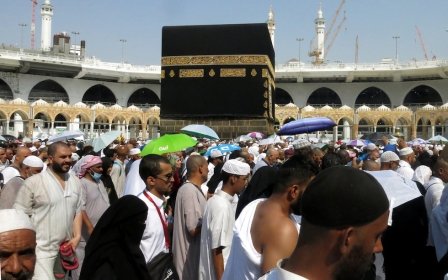Arab states ready for 'dialogue' but threaten more sanctions on Qatar
The foreign ministers of four Arab states boycotting Qatar said on Sunday they would make no compromises in their demand that Doha change its policies, as a political crisis that has split the Gulf approaches its third month.
Regional kingpin Saudi Arabia, Bahrain, the United Arab Emirates and Egypt broke ties with Qatar on 5 June, accusing the emirate of fostering Islamist extremist groups and of ties to Saudi arch-rival Iran. Qatar has denied the allegations.
The foreign ministers of Saudi Arabia, the UAE, Bahrain and Egypt, who met in the Bahraini capital on Sunday, said they were open to talks with Qatar on condition it "stops its support and financing of terrorism".
"We reiterate the importance of Qatar's compliance with the 13 demands outlined by the four states," said a joint statement released on Sunday.
The Saudi-led bloc in June issued the list of demands for the lifting of sanctions, including the termination of regional news giant Al-Jazeera, the downgrading of ties to Iran and the closure of a Turkish military base in the country.
Bahrain's foreign minister said that the Arab states were still open for dialogue with Qatar.
"The four countries are ready for dialogue with Qatar with the condition that it announces its sincere willingness to stop funding terrorism and extremism and its commitment to not interfere in other countries' foreign affairs and respond to the 13 demands," Sheikh Khalid bin Ahmed al-Khalifa said.
The pan-Arab al-Hayat newspaper reported on Sunday that the blockading countries were expected to discuss imposing new economic sanctions on Qatar.
Foreign ministers of the four countries "are expected to impose sanctions that will gradually affect the Qatari economy", the newspaper said, citing unidentified Gulf sources, without giving any further details.
Bahrain's state news agency BNA said on Saturday that King Hamad bin Isa al-Khalifa had hailed cooperation between the four countries in fighting terrorism.
King Hamad called for "the solidarity of all Arab countries in fighting terrorism and cutting off its financing ... for the defence of our homelands".
What's behind this crisis, of course, is Qatari sovereignty and independence to put it very simply
- Sheikh Saif bin Ahmed al-Thani, Qatari minister
Diplomatic efforts led by Kuwait and involving the United States and Turkey have failed to end the row, which has affected travel and communications between Qatar and the four countries and led to harsh verbal exchanges in the media.
Saudi Arabia has closed its land border with Qatar while all four countries have cut air and sea links with Doha, demanding the gas-exporting country take several measures to show it was changing its policies.
Turkey and Iran have stepped in to provide fresh produce, poultry and dairy products to Qatar instead of Saudi Arabia and the UAE, with Oman providing alternative ports to those in the UAE.
The four Arab countries added 18 more groups and individuals they say are linked to Qatar to their terrorist lists last week.
Kuwait is leading mediation efforts in the crisis, the worst to grip the region since the 1981 creation of the six-nation Gulf Cooperation Council.
Kuwait and Oman - GCC members along with Saudi Arabia, the United Arab Emirates, Bahrain and Qatar - have not joined the Qatar boycott.
On Friday, Qatar said it would never bow to Saudi-led demands to "outsource" its foreign policy to resolve the Gulf crisis.
Sheikh Saif bin Ahmed al-Thani, who holds ministerial rank, accused Doha's adversaries in the crisis – Saudi Arabia, the UAE, Bahrain and Egypt – of meddling in Qatar's internal affairs.
"What's behind this crisis, of course, is Qatari sovereignty and independence to put it very simply. It is about ... outsourcing our foreign policy so that decisions are not made in Qatar, and that is something that will never be acceptable," he told AFP.
Sheikh Saif said the Saudi-led bloc had laid down a new "ultimatum" on Tuesday by publishing a list of individuals and "terrorist" entities allegedly linked to Doha.
The blacklist contained nine organisations and nine individuals the Saudi-led bloc accuses of supporting terrorists with finances from Qatar.
This "list, it's still an ultimatum, it's still something that is stalling resolving the crisis," the official said.
However, "we have said it from the start, we are open to dialogue, we are open to negotiating ... The first step should be lifting the illegal blockade."
This article is available in French on Middle East Eye French edition.
Stay informed with MEE's newsletters
Sign up to get the latest alerts, insights and analysis, starting with Turkey Unpacked
Middle East Eye delivers independent and unrivalled coverage and analysis of the Middle East, North Africa and beyond. To learn more about republishing this content and the associated fees, please fill out this form. More about MEE can be found here.





